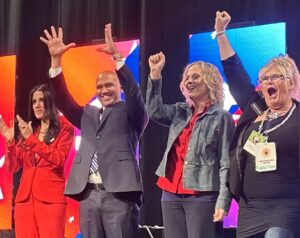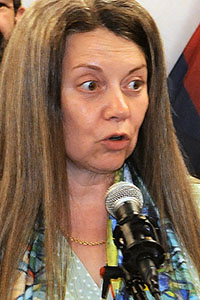Republicans long neglected a provision of campaign finance law allowing state political parties to coordinate with candidates, granting cheaper mail rates and greater, albeit indirect, corporate support for nominees.
But this 2023-2024 cycle, under new chair Gina Swoboda, the Republican Party of Arizona leveraged the strategy long-used by the other side to orchestrate high-caliber mail campaigns in competitive legislative districts.
Despite being outspent by the Democratic Party, Republican majorities grew stronger in both chambers, and consultants and the party treasurer point to the last ditch effort as a saving grace.
“Given what we were up against, we needed every possible advantage to compete with the other party financially,” said Chris Baker, consultant for Sen. Vince Leach, R-Tucson, who pitched the effort to Swoboda in August.. “It’s easy now to say, ‘Look, we won, you know, we picked up a seat in the Senate. We won two seats in the house. Everything went well.’ But three months ago, the general consensus was we were probably going to lose seats in both chambers.”
In 2016, as part of an overhaul of campaign finance, the Legislature passed a provision clearing the way for “the payment by a political party to support its nominee,” including printing, distributing and taking on postage expenses.
Under state law, state political parties can mail at nonprofit rates, which can be anywhere from 20% to 30% cheaper than the price paid by a candidate or committee.
Coordination can also open the door to roundabout benefits from investments from corporate donors, who would otherwise be barred from contributing to a candidate directly under Arizona law.
The same provision exists on the federal level, too, as the non-allocable mail rule.
“The current laws that govern interaction and coordination between the state party and candidates were written, drafted and passed by Republicans,” Daniel Scarpinato, consultant and President of Winged Victory Agency, said. “And yet have largely not been utilized by them, but have very effectively been used by Democrats.”
In past cycles, Democrats have by-and-large handed the reins to the state party on mailing, as well as TV and radio advertising.
Records from the Federal Communication Commission show the Arizona Democratic Party coordinated TV and radio advertising for Gov. Katie Hobbs’ run for secretary of state in 2018, for Adrian Fontes’ secretary of state campaign, Kris Mayes’ attorney general campaign and Hobbs’ gubernatorial campaign in 2022. In 2024, the party coordinated with competitive legislative candidates in select districts.
The same tactic has passed Republicans by until this election cycle.
Chris Baker and now-House Speaker Steve Montenegro pitched candidate coordination to Swoboda in early August.
“To her credit, it would have been easy for her to say, ‘Hey, you know, we’re not set up for this. Let’s get a longer runway, and maybe we’ll do it two years from now,’” Baker said. “But to her credit, she recognized the threat.”
Swoboda did not immediately respond to a request for an interview submitted to the party.
With an eye on competitive districts, Baker said the party then hired a candidates’ mail vendor or consultant to produce literature and then, with the greenlight from the legal team, pay for and distribute mailers.
Baker said that in order to make this work, the party pledged not “to play consultant, or author, and tell the candidates what they could or could not say,” but did set ground rules at the outset.
Each piece of mail was reviewed by the party’s legal team for any potentially libelous material, to avoid any legal liability and for any implicit or explicit attacks on either another Republican candidate or the Republican Party platform.
Attorney Kory Langhofer noted the state party’s responsibility and review is crucial in ensuring legal compliance.
“Legally, the state party must retain control of the message on non-allocable mail, and not just as a pass-through from the candidate,” Langhofer said. “So the whole program requires candidates to trust the party will target its mailing and design its mail pieces appropriately.”
All in all, according to Baker, the party coordinated mailers for 22 candidates, ranging from the Trump campaign to the legislative races.
Baker credited Swoboda and AZGOP Treasurer Elijah Norton for taking on the effort weeks before the general election.
“There would have been no dishonor for her to say, ‘Look, we just don’t have enough time.’ But she didn’t do it. She jumped in,” Baker said.
Norton said coordination required trust from candidates, given their part of paying into the state party, without any earmark or requirement the party spend the funds in a particular way.
Per pre-general election campaign finance reports, the higher candidate investments included about $75,000 from state Sen. Shawna Bolick, R-Phoenix, over the course of the cycle, and $70,000 from Sen.-elect Carine Werner.
Norton said this cycle’s program saw about $700,000 put in from candidates and a return $750,000 investment from the party.
“Once a legislative candidate donates to the party, the party can do whatever it wants with that money,” Norton said. He said Swoboda’s standing as party chair made a significant difference, drawing a contrast to past party chairs.
“For example, under Kelli Ward and Pam Kirby, they spent 200 grand on a bus and a party, and I just don’t think people thought they were going to be good stewards of contributions,” Norton said. “And in this new administration, we were very fiscally conservative. We didn’t do an election night party. We focused on spending all of our resources on winning races, and that was obviously reflected in the results.”
Norton noted corporate donors came back to the party, too, noting contributions from the Arizona Restaurant Association, which contributed $24,000, and the Arizona Chamber of Commerce and Industry, which gave $48,000.
The AZGOP reported about $4,000 from corporations in the first quarter, $136,208 in the second, $18,500 in the third, and $96,000 in the pre-general report.
“It was trust,” North said. “I think donors and organizations and groups have to and candidates have to trust the party to be good stewards of the donations that they give. And if they don’t have trust, then they don’t give. When we would receive a contribution, we would make sure that the contribution was spent on winning races, not on all the finer things that prior administrations wasted it on in the past.”
And win races they did.
Republicans grew their majority in the House to 33-27, and picked up one seat in the Senate, winning seats in key swing districts.
Baker said the strategy made all the difference for Leach, noting he came out of a competitive primary against incumbent Sen. Justine Wadsack with “basically no money.”
He said Leach sent nine pieces of mail through coordination with the state party to a neighborhood of 30,000 to 35,000 voters.
Anecdotally, as one of the reviewers of other candidate mail, he said candidates in other districts, campaigns sent anywhere from five to eight pieces of mail to equally, if not more, expansive voter lists.
“We maybe would have been able to do half that. In a close race like that, that was a game changer,” Baker said. “It really made all the difference in the world for us. I think a lot of candidates in these very tight, competitive races would say the same thing.”































